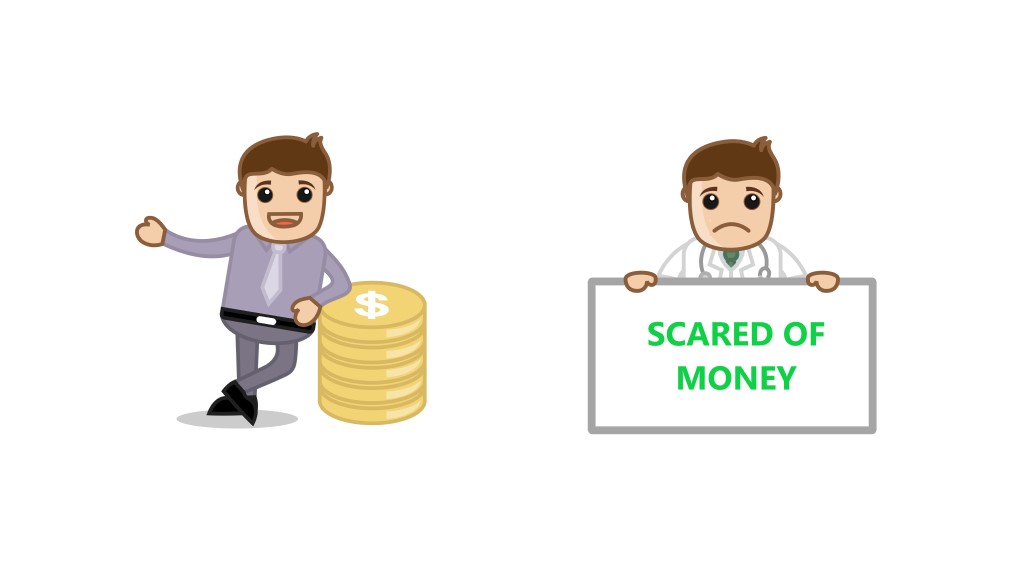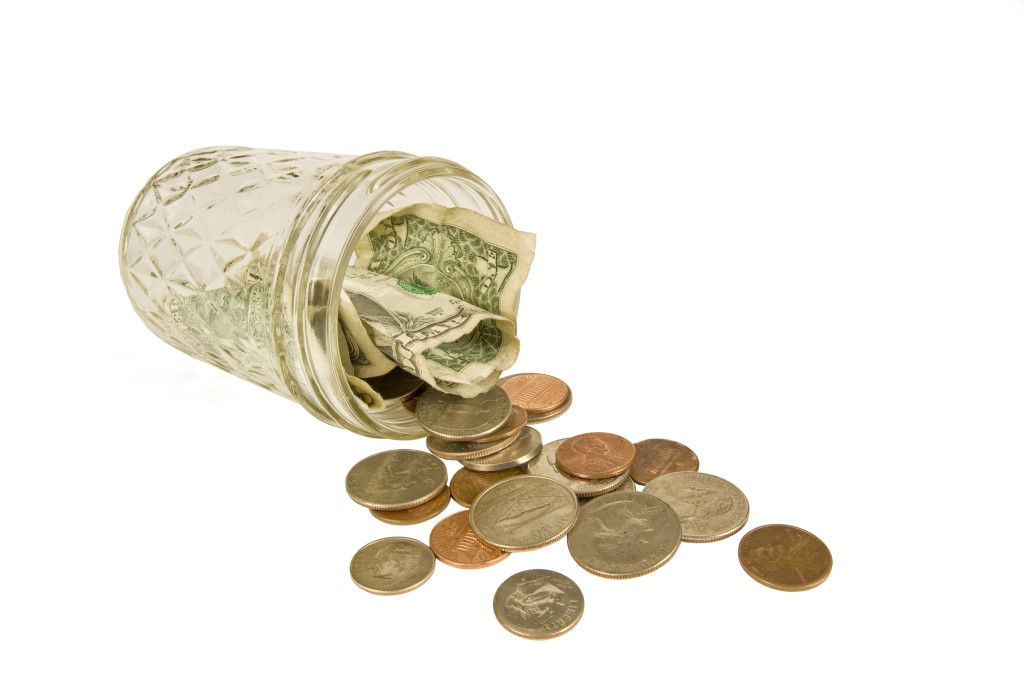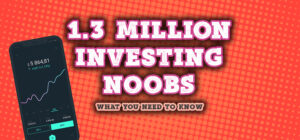A stock market crash affects all of us, whether we invest or not.
Your non-investor mates in the office don’t care about the recent market crash, because they don’t educate themselves in personal finance; but we’re sure you know better.
In this article we show the ways that both investors AND investors are affected by a stock market crash – just like the one we are in right now.
Editor’s note: Take advantage of the stock market crash with a boost when you open a new investment account using one of the links on the Offers page! Freebies include free shares, cash bonuses, or money off your fees.
YouTube Video > > >
“I Don’t Invest” – Of Course You Do!
Let’s touch briefly on pensions.
Almost everyone who works invests in the stock market without knowing about it via their defined contribution pension.
£600bn is held in defined contribution pensions – simplistically, if a quarter is shaved off the stock market, £150bn of our pensions just went “poof”.
However – don’t be too alarmed by this. By the time you retire the current slump will likely be forgotten.
Though worryingly, most let experts manage their pension pot for them; and experts are stupid.
Experts can’t help but fiddle, and during a financial crisis will try, but likely fail, to improve the situation.
Ideally your pension will invest in market trackers that do not require experts to manage, in which case you simply ride out the current market slump.

If You’re Over 50
People approaching retirement are in more trouble. As you approach your agreed retirement age, pension managers will de-risk your portfolio by selling shares and buying bonds, liquidising losses.
The “experts” will do this for you. Thanks experts.
If you are planning on buying annuities with your pension pot, the worst time to do this is during a crash.
Your pot will be a lot smaller than it could have been, and so will be the annuity income that you lock in for the future.
But if you’re not bothering with annuities and plan simply to live off your portfolio’s dividends – like we would – the stock market will eventually recover so your income will likely go up once the crash is over.
Ok that’s pensions – but that’s way off in Future Land – what about right now?
Non-Investors
Ignoring pensions then, if you “don’t invest” in the sense that you have neither a stocks portfolio, investment property, nor high interest bonds or Peer to Peer Lending, you should be deeply concerned right now that you have earned the disrespect of everyone in the investing community for continuing to NOT invest during the biggest bargain sale on the stock market in the last several years.
You’re making a conscious decision right now to stay poor; to have your wealth and your health affected by staying sat at your office desk for the next several decades; to miss out on being able to retire relatively young and make life about having fun – all by refusing to take advantage of low, low prices.
Ok, maybe it’s just that you don’t know how to get started? If that’s all it is, don’t worry! Investing has never been easier.
Mobile phone apps and the internet remove all possible excuses for not having a shares portfolio – for a full explanation of how I opened an investing account and immediately set up a balanced and diversified portfolio of thousands of shares in the global market, go put the kettle on, make a brew and settle down to watch half an hour of our World Portfolio playlist.

Interest Rates
The stock market doesn’t directly affect interest rates – however, when governments and central banks see markets crashing, they also can’t help themselves but to fiddle.
Indeed, this is what we’ve just seen, with the Bank of England having just slashed interest rates from the lofty heights of 0.75% to 0.1%.
The simplest mechanism a country can use to prop up a falling market is to lower interest rates – the cost of borrowing. This tends to encourage spending by the population, which in turn boosts company profits and share prices.
Usually the stock market has fallen for a reason, like the current health scare, and the stimulus from lower interest rates is introduced to combat that reason – but governments don’t like to see their stock markets falling in any case, as it self-perpetuates panic and a country’s stock index price is seen as an indicator by us consumers as whether we should be panicking or not.
Mortgages and Savings Accounts
Falling interest rates don’t really matter anymore for savings accounts – they were so pathetically low before anyway. You weren’t getting rich from your savings account.
Anyone with a mortgage will be celebrating the stock market crash however, as the resulting slash to interest rates could save them hundreds a month.

Peer to Peer Lending
We are massive fans of Peer to Peer Lending, and have partnerships with many providers that you can check out on our website to give you cash back bonuses when you sign up.
But will these high interest investments be giving out lower interest rates now that central banks have lowered rates?
We assumed they would, but we’ve received emails from many Peer-to-Peer Lending platforms this last fortnight saying that they will not be reducing their interest rates – that it will be business as usual. I guess time will tell.
We think they’re seeing this as an opportunity to attract new customers, as the difference in return between pathetic bank savings accounts and P2P high interest investing is now more stark.
And maybe that justifies them being still able to offer the same high rates.
Jobs
Many companies will be smashed into oblivion by a major stock market crash, as wider economic panic dries up sales to a level where they have to close down. This leads to redundancies.
Flybe was the first major company to go down this time around, and in the weeks since there have been reports of branch closures at banks and lots of mid-sized companies going tits-up.
If our employers were to tell us we had to be let go, we’d shrug it off because years ago we decided to be investors; and have built up portfolios that we can live off.
But many choose NOT to be financially free and instead choose job “security“, and sadly these people will have little protection during a jobs-cut. Hopefully their qualifications allow them to get another job quickly.

What to Do to Protect Yourself from A Falling Stock Market
#1 If You Have A Portfolio Already
Don’t sell – investing is a long-term game, and a loss is only a loss once you crystallise it by selling. Buy more while the price is low!
#2 If You Don’t Yet Invest
Start! Buy now while prices are low, and capitalise on hysteria in the markets. Non investors are scared away from the stock market during downturns, when they should be paying the most attention.
#3 Don’t Panic About Your Pension Falling – unless you’re nearing retirement age
If you’re retiring soon, take control of your pension and make sure the “experts” aren’t selling off your wealth at just the wrong time. And be wary of annuities.
#4 Don’t Settle for Low Interest
Consider taking refuge from the stock market volatility in more stable Peer to Peer Lending platforms for high interest monthly income now.
Always remember to invest across platforms to minimise risk.
#5 F-Off Fund
Build up a F-Off fund, or “emergency fund”, so you can better cope with a job loss.
#6 Diversify Incomes
Take steps now to diversify your income streams away from just the one job, with interest, dividend or rent paying investments and side hustle home businesses, and you’ll be better prepared to deal with a crash when it happens.
How are you feeling about the stock market crash? Disaster, opportunity, or irrelevance? Tell us in the comments below!




